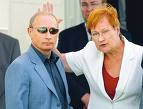Hero or Henchman
 Sellise pealkirja all ilmus tänases The Moscow Timesis kaks arvamuslugu Arnold Meri protsessist ja selle lahtimõtestamisest. Üks nendest kuulub Vene Riigiduuma saadikule Ilja Ponomarjovile, teine mulle. Lisaks otseviitele panin oma teksti ka siin üles.
Sellise pealkirja all ilmus tänases The Moscow Timesis kaks arvamuslugu Arnold Meri protsessist ja selle lahtimõtestamisest. Üks nendest kuulub Vene Riigiduuma saadikule Ilja Ponomarjovile, teine mulle. Lisaks otseviitele panin oma teksti ka siin üles.In recent days, the court proceedings in the small Estonian town of Kardla, where Arnold Meri stands trial for crimes against humanity, have gained much attention in the Russian press.
Unfortunately, this case reveals dramatically how biased and truth-fearing the media landscape of Russia is today. Naturally, no word is spoken or written about the fact that Meri is accused of carrying out deportations under Estonian legislation and international law.
The Russian media only proclaim that Meri was given the Hero of the Soviet Union award and that, in their view, the court case of the 88-year-old veteran is only a political trial orchestrated by the Estonian authorities. It is all supposed to serve the purpose of "rewriting" the outcomes of the World War II, we are told.
Following this logic, it might be assumed that all heroes of the Soviet Union enjoy a life-long immunity and can kill, rape or deport with impunity. It is sad if this is the contemporary Russian view of the rule of law.
There is no statute of limitations on crimes against humanity. It is not important who committed them and when. Eleven persons accused of crimes against humanity have been convicted in Estonia from 1995, eight of whom participated the deportation of civilians in the 1940s. Even the European Court of Human Rights in its decision of Jan. 17, 2006, supported the Estonian court practice of trying and prosecuting crimes against humanity.
Meri is accused of carrying out deportations of 251 people -- mostly women and children -- from the Estonian island of Hiiumaa on March 25, 1949. On that day, the Soviet occupation forces deported altogether 20,000 people from Estonia. Unfortunately, that was not the only tragedy in the sufferings of the Estonian people in the 1940s.
A similar episode occurred on June 14, 1941, when the People's Commissariat for Interior Affairs of the Soviet Union organized the deportation of more than 10,000 residents of Estonia, among whom nearly 5,000 women and 2,500 children. More than 3,000 of them were sent directly to prison camps, where the majority were killed or died.
For most Russians, the Soviet Union's victory in World War II, which is officially called the Great Patriotic War in Russia, has been elevated to the single most important historical event. No one today questions the importance of the Allies' defeat of Nazism. What raises concerns, however, is that the victory over Nazi Germany is told in rigorous black-and-white terms. We know that history is a growing collection of narratives with countless nuances. No historical event occurs in a vacuum. This is true for the Great Patriotic War, and it is important to analyze all of events that preceded and followed the war.
I am convinced that many Russians are more knowledgeable and balanced than the ruling elite in analyzing and interpreting World War II and its aftermath.
Deep wounds in the memory of nations heal very slowly. The feelings of distrust and even hatred can be easily fomented and manipulated. It is very difficult to earn respect by trampling on the truth, and leaders who try to stifle the historical sense of entire nations with this peculiar weapon of history are doing a terrible disservice to their citizens, the consequences of which may be irreversible.



Kommentaarid
ilmselt olen